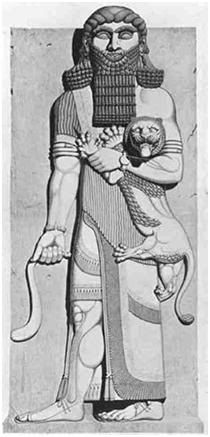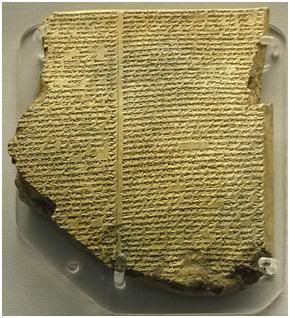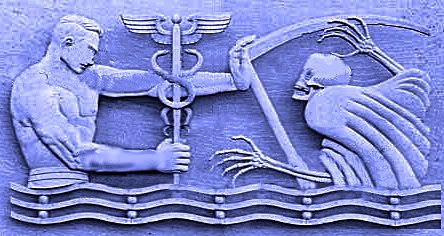 Mike Darwin By Mike Darwin I was cold and edgy. We had departed Mosul well before dawn, in order to arrive at Nineveh before the call to morning prayers. Mosul had been a jumble of box-like, recent construction; unimpressive Mosques and the grim and gritty dwellings of the poor. The drive had been the usual terrifying excursion into the pitch blackness of a moonless night, with only the infrequent and very momentary benefit of headlights. A burned out headlamp is a financial disaster in this part of the Arab world, so road travel proceeds at breakneck speed in complete darkness, with only brief flashes of the headlights to keep the driver in position on the road and from colliding, head-on, with any oncoming traffic. As the situation (and available time) permitted, I would see the rest of Nineveh at a more leisurely pace, but for now, my objective was Kuyunjik, and the site where Sir Austen Henry Layard had completed his excavations of the Royal Library of Ashurbanipal, in 1847. My guide had assured me he could take me to the site, providing I could supply the necessary baksheesh[1]. War and rumors of war were in the air, and I was by no means supposed to be where I was. The black goatee, the keffiyeh,[2] and the nondescript khaki clothing I was wearing had served me well. The stink of the dihydroxyacetone in the skin bronzer I’d been applying for days further reassured me that as long as I remained silent, and in the company of my guide and driver, I could proceed unmolested. Nineveh is falling to ruins, and Kuyunjik was a cratered mound. The sun, floating higher and higher in the sky, began to take the worst of the chill from the air. This was Kuyunjik, this was Nineveh, and I was here. I tried to cast my mind back ~2,700 years, and see Ashurbanipal, the last of the great Akkadian kings (685 BCE – 627 BCE) wandering the stacks of the world’s first library. It was Ashurbanipal who had first conceived of, and implemented the idea of a great library, and he had assembled the largest collection of written documents in the history of the world to that time. It is said that when Alexander the Great saw Ashurbanipal’s Library, he resolved to have one of his own, and while he did not survive to see the task begun, it was nevertheless initiated by his successor, Ptolemy I; a project that went on to become The Royal Library of Alexandria. Among those thousands upon thousands of clay tablets covered in cuneiform, 12 particularly important tablets would survive the passing Centuries, to be discovered by Layard in the middle of the 19th. Those tablets comprise the corpus of the first (known) book: The Epic of Gilgamesh. What did the first man who wrote a book take as his primary subject? Did he write about gods or religion? Did he write about lust, romance, politics, social life, or the law? Did he write a travelogue, or a comedy? Surprisingly, at least from this civilization’s perspective, the answer is, “No.” Instead this what he wrote: “It is an old story  Gilgamesh Gilgamesh, we are told, is the king of Uruk, who is two-thirds god, and one-third man, who built a great city with high walls; much like Nineveh was 2,000 years ago. Gilgamesh was all things men and women want in man; physically beautiful, highly intelligent and enormously powerful – and these blessing were matched only by his tyranny, brutality and utter disregard for other men. His people cried out in misery and the gods, hearing their pleas, created a wild man, Enkidu, to challenge and transform Gilgamesh. Enkidu does indeed transform Gilgamesh, and the two become soul-mates – great friends and constant companions, who set out to explore the world together.On one of their adventures, Ishtar, the goddess of love, is overcome with lust for Gilgamesh, and he makes the costly error of rebuffing her. Ishtar, in high dudgeon, petitions her father, Anu, the god of the sky, to send the Bull of Heaven to punish him. Seven years of famine ensue until finally, Gilgamesh and Enkidu wrestle with the Bull, and kill it. This grave and unexpected act of defiance prompts the gods to meet and to decide that Enkidu must die, as punishment for this challenge to their authority. And so, in great agony and fear of death whilst beset by tormenting visions of the underworld, Enkidu dies after a prolonged illness.  Epic of Gilgamesh, tablet 11, story of the Flood, on display in the British Museum in London, UK. In Gilgamesh’s grief for Enkidu, he comes to two terrible realizations: not only has he lost a friend to death, whom he is powerless to reclaim, he also realizes that he too will die, that all of his strength, wealth and intelligence are useless against the march of time. Gilgamesh thus sets out to find Utnapishtim, the Mesopotamian Noah.After almost exterminating humanity in a fit pique, the gods had granted Utnapishtim eternal life, and in fact they confide in him the secret of that endless boon. At great risk, and after many hardships, Gilgamesh meets Utnapishtim, and pleads his case for personal immortality. Whereupon Utnapishtim gives him a test: “If you think you can stay alive for eternity, surely you can stay awake for a week?” Utnapishtim asks. Not surprisingly, Gilgamesh fails this test and Utnapishtim commands him to return to Uruk and accept his mortality. Just as Gilgamesh is about to depart, Utnapishtim’s wife convinces him to tell Gilgamesh about a plant that, if eaten, will restore youth and prolong life indefinitely. Gilgamesh finds the plant and begins the journey back to Uruk, only to have the plant stolen from him by a serpent as he rests – which promptly sheds her skin and becomes young again. He returns to Uruk chastened, to rule over his substitute for immortality: the city he has built and the people who will live on thru time. And so we see that Gilgamesh’s story is our story, and his central problem is ours, as well; principally how to put an end to the tyranny that is time. In The Epic, Gilgamesh masters many of the environmental spheres that man has sought dominion over (he is after all, 2./3rds god). In our recent (Western) history, most of these spheres have, at one time or another, been called the “Final Frontier,” with space being the last to earn that moniker. In fact, as we are instructed in The Epic, there is really only one final frontier, and that is to end time. Not merely to conquer it, nor to transcend it, but to end it. This may or may not be possible, but it is an ideal that is essential to pursue, both for our survival as individuals and as a species. One sunny summer day 2 years ago, I stood in the British Museum and looked upon a few of the tablets that comprise The Epic. They were long ago transported from the mound that is now Kuyunjik, and are encased in Perspex, and kept safely out of reach of the Museum’s passing visitors. There, before me, was the First Book, by the first man to write of the central problems of the human condition: death, and the tyranny of time. The conclusion of The Epic is that “personal death is acceptable, so long as mankind lives on,” and that, too, is the position of every society and every civilization that has existed before or after The Epic was written. There is wisdom in this, because to be preoccupied with that which cannot be changed is to sink in ennui, and succumb to death with even more immediacy. This strategy, under those conditions, may fairly be said to have been necessary to the survival of the individual, as well as the species. But this strategy is not written in stone for us, even if it is so written in clay. Evolution is a mechanism with no credible evidence of a maker. It has no goals, no values, no dreams, and no desires. It proceeds from no plan, and it engineers from no blueprints. And yet, it has produced us. After ~4.5 billion years of blind trial and error, and the accompanying sacrifice of countless living things – at the cost of even more unfathomable suffering – a species has at last emerged that can see and understand these things, and, for the first time, exercise design, and bring consciousness to the chaos. Still, until the development of the scientific method, and the advent of technological civilization, there was no prospect of our species gaining control of its destiny. These developments are very recent – and they carry with them at least as much peril as they do promise.
To this some will shrug and say, “So what?” Many will be moved to observe that we can proceed to survive as a species without individual, personal, immortality. Many more will positively assert that any further extension of the human life span will be deleterious to the survival of our species, and that immortality would quickly end it. These assertions are both specious and deeply dangerous, because we have made an astonishing and incredibly perilous transition. With the advent of scientific, technological civilization, we crossed a great gulf. The only event in our history that is comparable is our mastery of fire – the one thing, more than any other that makes us unique amongst life forms on this planet. However, that first Promethean step is dwarfed by what we have now achieved. We no longer play with mortals’ toys. We command the atom and we have commenced to open the Pandora’s Box of nanotechnology. As a consequence, we can no longer afford the loss of billions of minds, and many billions of man-years of accumulated human experience every 50 years or so. If we wish to play with the tools of the gods, then we must learn to behave like them. We have mastered fire; and in so doing have fouled our planet’s air and water. Because we live only briefly, we have little ability to see the long term consequences of our actions, and we (like all others before us), cannot truly suffer the effects of our ignorance and recklessness through our children. If we are to behave responsibly with respect to the long term effects of our deeds, we must live long enough to experience them firsthand. Approximately every fifty years, the accumulated wisdom and experience of an entire generation is wiped out. Yes, some tiny fraction of the knowledge can be (and is) captured in books and other ‘media.’ But knowledge is not wisdom; wisdom is a property of the conscious mind imbued with memory and experience. Wiping out all the hard won accumulated wisdom (and in reality most of the real knowledge, in the bargain) of each human generation is incredibly wasteful – and destructive. This was unavoidable in the past, and it was tolerable because we were barely better than beasts, and we played only with mortals’ things. But it is no longer acceptable. Quite apart from the terrible injustice that death represents for the individual, it is no longer a tenable option for us as species. It has become an expense we can no longer pay, a debt we can no longer afford to service. Consider this timely analogy. One of the great problems in economies is the loss of institutional memory for infrequent, but disastrous events. Just about the time the last individuals are dying out from the previous round of economic madness and irresponsibility, another round occurs. This timing is not coincidental; you have to live through some kinds of errors and experience them for yourself, before you can avoid them in the future. That’s exactly what a big part of becoming an adult , and growing up are all about; everybody knows you can’t tell a child, or teenager, about ‘responsibility,’ or about being taken advantage of, or about how to manage money wisely. That kind of knowledge comes only through experience. At present, we are manipulating technologies so vast and so powerful that we will get only one chance to get it right (and that only if we are lucky). There will be no forgiveness for playing the technological equivalent of 1929, over and over again, as we have just done now.
It is time for us to grow up and to recover the ‘lost secret of immortality,’ and embrace our duty to shepherd ourselves, as well as all those we love and care about, to the end of time as we now know it. The challenge we face now is to understand, and to own time itself; the Chronosphere, the very last frontier. It is a world without death, and a world without time. If you have the courage and the fortitude to engage in the battle for it, it can be your world, and I invite you to join us in the quest for it. But be warned, it is not a world that will be easily won, but it will be the only one worth inhabiting. Footnotes [1] The Arabic word for money is “fuloos,” but you will almost never hear it used. Instead the word “bakasheesh,” which translates literally as “the teat,” is used, and it implies bribery and corruption. [2] A keffiyeh is a traditional headdress typically worn by Arab men around the head and neck. It is made from a square piece of pattern-printed cotton fabric. It is often held in place on the head by use of an Igal, which is usually made of camel’s or goat’s hair, and raw wool. Since I could never fold the scarf well, I always used an Igal. |
-
Recent Posts
Recent Comments
- Kevin Perry on About
- Kristina on Interventive Gerontology 1.0.02: First, Try to Make it to the Mean: Diet as a life extending tool, Part 2
- Kristina on Interventive Gerontology 1.0.02: First, Try to Make it to the Mean: Diet as a life extending tool, Part 2
- Jeffrey Sites on A Brief Pictorial History of Extracorporeal Technology in Cryonics – Part 5
- peter gouras on Science Fiction, Double Feature, 2: Part 3
Archives
Categories
Meta

 The tools of science and technology have also informed us that, absent our intervention, the extinction of our species, as well as that of all life on earth is inevitable. Whether from an asteroid drawn too near by gravity, or the eventual death of the sun, our days are numbered. We know what the men of Akkadia – and those who came before them – could not know, and that is that humankind will not continue forever. We are as mortal as a species, as we are as individual men.
The tools of science and technology have also informed us that, absent our intervention, the extinction of our species, as well as that of all life on earth is inevitable. Whether from an asteroid drawn too near by gravity, or the eventual death of the sun, our days are numbered. We know what the men of Akkadia – and those who came before them – could not know, and that is that humankind will not continue forever. We are as mortal as a species, as we are as individual men.
you show a great appreciation for the history of man, but you seem to lack an appreciation for the mystical element in the modern human psyche. It is about the same as ever: homo sapiens cannot relate to the idea of life after death without using religion. Until a cryogospel is preached, cryonics will continue to fail. At least until science can provide a proof of concept by reviving an animal from LN2. And that is perhaps 100 years away.
And cryonics has failed. 1200 signups after 40+ years? A massive failure…because of your failure to understand some basic things about the human psyche.
The dictionary definition of religion is as follows;
re·li·gion [ ri líjjən ]
1. beliefs and worship: people’s beliefs and opinions concerning the existence, nature, and worship of a deity or deities, and divine involvement in the universe and human life
2. system: an institutionalized or personal system of beliefs and practices relating to the divine
3. personal beliefs or values: a set of strongly-held beliefs, values, and attitudes that somebody lives by
I have read what you have written here, and elsewhere, and I am now giving you that for which you ask. Be patient. We are not yet gods, but we can be. The road there is a long and hard one – filled with both hazard and adventure. So, listen, while I tell you a mystery…
Mike Darwin
Unperson, you live in an unrepresentative part of the U.S. (Texas and the South). How would a religious presentation of cryonics work in parts of the U.S. like the Pacific Northwest and New England, where people display about half the level of religiosity as Southerners?
http://www.gallup.com/poll/114022/state-states-importance-religion.aspx
In terms of religion, the Southern states also have more in common with countries like Egypt and Iran than they do with the more developed parts of the U.S. and with other developed countries:
http://www.gallup.com/poll/114211/alabamians-iranians-common.aspx
In fact, the data conflict with the idea that existential issues make people religious. Western Europeans, Australians, Canadians, the Japanese, etc. die like everyone else; but they seem much less inclined to organize their lives around religion because of that fact than people in societies with more primitive cultures, like Texas.
Gregory S. Paul has also written about this trend based on his study of the social science research. He thinks social democracy, specifically the universal health insurance favored by progressives, plays a major role:
http://gspaulscienceofreligion.com/
again, mark, I live the rust belt now, and I plan on having my agency transfer me to cali, az or nm within a year.
But it does not matter. I have lived all over america, literally, and I have traveled half way across the world. Homo sapiens is more or less the same, with some variations.
Again, I am fairly certain you cherry pick the data. Also, I doubt that the people who are of the age groups that would sign up for cryonics are particularly atheistic. I think the best way to proceed for the next 100 years is to look for middle aged people in churches, and offer a brand of cryonics that is supported by the bible, and a brand of cryonics that is really really cheap and that is supported primarily by church members at the local level.
Rapid technological progress was an illusion. Time to retrench and seek refuge in religion until basic science and technology progress enough to revive some animal from LN2.
And, mike, you love homo sapiens from the distant past, but you hate homo sapiens of the present. Check yourself before you wreck yerself. Better start lovin’ the common man, cuz they are the salvation of cryonics